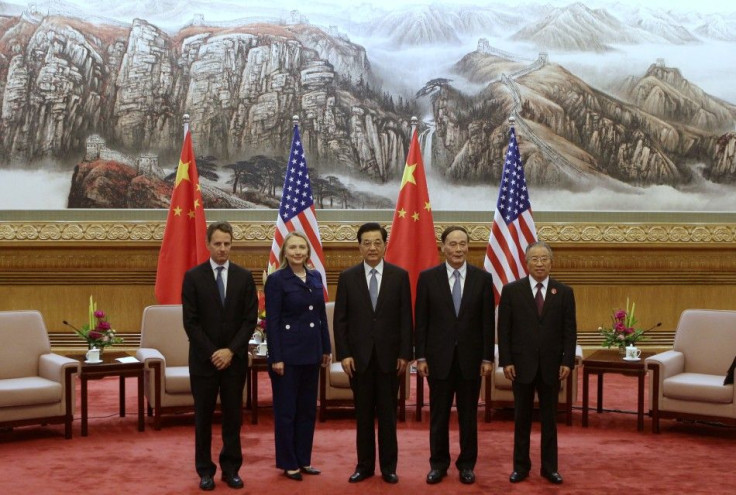Chinese And US Leaders Attempt To Highlight Cooperation Over Differences

At the end of the high-level strategic talks between the U.S. and China, both countries have vowed to improve relations and to prevent human rights from becoming a major diplomatic stumbling block.
U.S. Secretary of State Hillary Rodham Clinton and her counterpart, China's State Councilor Dai Bingguo, met on Friday to discuss a myriad of complex issues confronting both countries.
Clinton and U.S. Treasury Secretary Timothy F. Geithner received a red-carpet welcome during their stay, also meeting with Chinese President Hu Jintao, Premier Wen Jiabao, and Vice President Xi Jinping.
In a Strategic and Economic Dialogue, or S&ED, statement on Friday, Clinton said: Our countries are growing more interdependent ... so we need to build a resilient relationship that allows both of us to thrive and meet our regional and global responsibilities without unhealthy competition, rivalry, or conflict. Zero-sum thinking will lead only to negative-sum results.
The second and final day of the fourth S&ED between the two countries was dominated by the attitude reflected in the above statement, mirroring what the Chinese like to call maintaining win-win relations. In other words, both sides are making firm efforts to highlight a spirit of cooperation regardless of recent frictions.
Clinton stressed the two countries had shared frank viewpoints on a number of key global issues, a reflection of their mutual respect and cooperative intentions. She said the U.S. and China had discussed the two Sudans, Syria, Korea, Iran, and cybersecurity. On the latter issue, Clinton remarked that China and the U.S. still needed to work to develop a shared understanding of acceptable norms of behavior in cyberspace.
Clinton mentioned that while human-rights issues had been brought up with the Chinese side, It is very important ... to acknowledge that we cannot allow disagreements to derail our relationship or hold back our cooperation on the broad range of matters that are of vital importance to our two nations.
Dai, in turn, told reporters that the issue of human rights should neither be a hindrance for state-to-state relations, nor be used as an excuse to interfere in the domestic affairs of other nations, according to the official Xinhua News Agency.
Dai added that China has witnessed great progress in its cause of human rights in recent decades and that no nation is perfect on the issue of human rights. He said, China will continue advancing on the right path it has chosen to make the Chinese people live happier and more dignified lives and make society fairer and more harmonious.
While Dai avoided mentioning to the press North Korea, Syria, and cybersecurity, sensitive foreign policy issues in China, he said the two countries had discussed energy security, climate change, the Sudans, and South Asia.
Following the first day of discussions between U.S. Treasury Secretary Geithner and Chinese Vice Premier Wang Qishan -- a day heavy on talk about economic reforms -- China announced on Friday that it would now allow foreign companies to increase their ownership of joint ventures with Chinese securities firms to 49 percent from 33 percent.
Neither side acknowledged whether there were any discussion of disputes in the South China Sea, such as China's ongoing confrontation with the Philippines, a U.S. ally, over the Scarborough Shoal.
© Copyright IBTimes 2024. All rights reserved.











